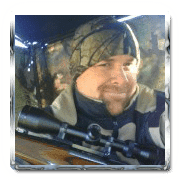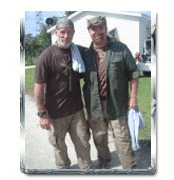
Charley, P.R.E.P.’s chief instructor, has both military and civilian experience that he shares with his students.
While there appears to be ample prepping training courses in the Southern and Western regions of America, those of us who live in the Midwest or Eastern regions of the state are often left with only two options when it comes to enhancing our survival and off the grid skills: spending a lot of money to travel elsewhere, or garnering our knowledge solely from reading a book or website post. P.R.E.P. is about to solve that problem with virtual training courses.
The Personal Readiness Education Programs (or P.R.E.P.) company was founded in Florida just a few years ago. Owners Courtney and Charley saw a void in the preparedness-training realm and made it their mission to educate as many of their fellow Americans as possible. The struggling economy and lack of preparedness for natural disasters were among the driving forces behind the decision to open a training center in the southern region of the Sunshine State.
The pair of prepping experts wanted to go beyond the basics of self-sufficiency education and delve deeper into the mindset and skills necessary to survive a massive natural or man-made disaster and the civil unrest which would likely follow.
Off The Grid News recently sat down with the P.R.E.P. founders to learn more about the opportunities for in-depth self-reliance training and preparedness activities. Click here to see the first part of the interview.
OTG: Who is your chief instructor and what is his background?
PREP: Born and raised in Florida, Charley is our resident chief instructor on emergency preparedness and disaster readiness. Charley is a registered disaster inspector and certified wind zone mitigation inspector and holds several state-level certified construction licenses. He is currently pursuing a college certificate program for emergency planning and business continuity operations and holds over twenty FEMA certifications. Prior to focusing his life on personal emergency preparedness, he served sixteen years in both the U.S. Army and the Florida National Guard. He was an honors student in a class of 436 soldiers at the Leadership Development School in Fort Benning, Georgia, and has received many other leadership and survival certifications. His experience has been tested on several continents and in many natural disasters.
During his time as a lead scout with the 11th Armored Cavalry, U.S. Army, he spent years deployed to Europe honing his skills in reconnaissance, first aid, and humanitarian missions. In the aftermath of the Chernobyl incident, he was deployed to monitor the radiation dispersal over much of the fresh food system of Eastern and Western Europe.
After returning to the United States, he was in one of the first units of National Guard to be deployed to the aftermath of Hurricane Andrew. His unit provided support by establishing relief areas to take care of basic human needs. Charley was also responsible for local security measures, including planning and participation of patrol units, looting prevention and serving as a liaison to local law enforcement to maintain order in a time of chaos and disarray.

Charley trained with Dave Canterbury from The Pathfinder School and Discovery Channel’s “Dual Survival” series.
In addition, he has provided security for both foreign dignitaries and government officials. After leaving the armed forces, Charley has continued fortify his skills in disaster and family emergency preparedness. Charley is now a Palm Beach County CERT Team Leader. CERT stands for community emergency response team. As head of his local CERT team, he has undergone additional training in disaster preparedness, fire suppression, medical triage, search and rescue, disaster psychology, and terrorism threats. He is also a certified graduate of the Pathfinder School’s Advanced Swamp Survival Course. This course was hosted by David Canterbury of the Discovery Channel’s Dual Survivor program along with several experts in various fields of survival. The program was developed to understand the difficulties of survival in an austere environment while being deprived of normal sources of food, water, rest and equipment.
As a business owner specializing in utility infrastructure construction and project management, he has extensive experience in preparing both home and business for any sort of disaster. This combination of military and civilian skills has made him a valuable teacher and mentor.
OTG: How has your military experience impacted the way you prep?
PREP – Charley: My past experience with the U.S. Army has had a huge impact on the way that we prepare and the way that I teach. I spent time in a post-nuclear Chernobyl, helped calm riots in South Florida post Hurricane Andrew, and have had extensive training in all of the above areas. My knowledge gives me a much more in-depth understanding of these events, how to prepare for them, and how to behave post-disaster. I not only provide background information, but I can also speak from personal experience as to what works and what doesn’t. This is what makes us the premier preparedness education center in Florida for emergency preparedness; we’re not just taking info off the Internet or from some Amazon book written by someone else and regurgitating it to our clients. Instead, we have lived this lifestyle for years, and have taken the time to provide real world experience and first-hand knowledge to our clients.
OTG: Many, many websites, even big-box stores like Walmart are now offering prepper gear for sale. Do you personally test all of the items listed in the P.R.E.P. store?
PREP: Yes, we absolutely test all of the gear that we carry. We are approached on a daily basis by companies that want us to put their products in our store, but we will not blindly endorse anything that we haven’t dragged through the mud or dropped off the roof. Would we make more money if we carried more products? Sure, but we’re not about to put someone’s health and safety at risk for a profit margin.
OTG: Prepping has gone more mainstream in the past year or so. Why do you think that more Americans are engaging in preparedness stockpiling and self-reliance training on some level?
PREP: With all of the political and financial turmoil in the last couple of years, the American people seem to be moving towards the idea that the only way to take care of their family is to take the reins and work for themselves. We’ve been through a lot of natural disasters as well, and I think more people are waking up to the idea that the government isn’t always going to be there with a warm bed and a hot meal; they just can’t be everywhere and helping everyone. It also seems that the “locavore” movement has expanded into a homesteading and self-sufficient mind set, which is really great to see. It’s been a wonderful move to see prepping become less crazy and more mainstream, and that people are beginning to wake up to how important it is to take care of their families.
How long before a major pandemic takes hold?What are the chances of an EMP event? Have these questions and more… fb.me/1VvNRnpiE
— Charley PREP (@shoestringprep) April 24, 2013
 Off The Grid News Better Ideas For Off The Grid Living
Off The Grid News Better Ideas For Off The Grid Living



